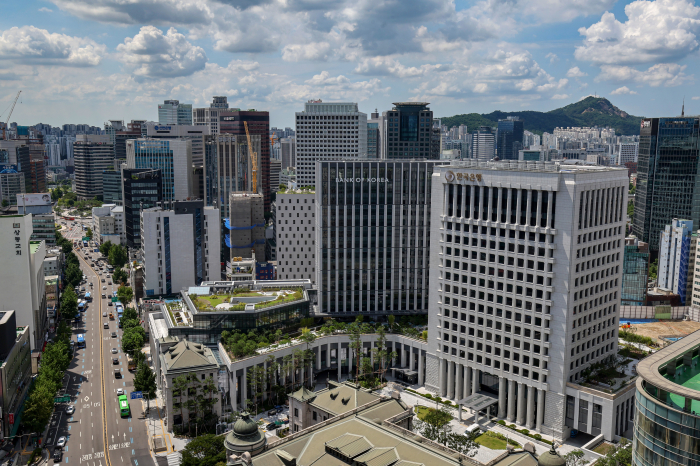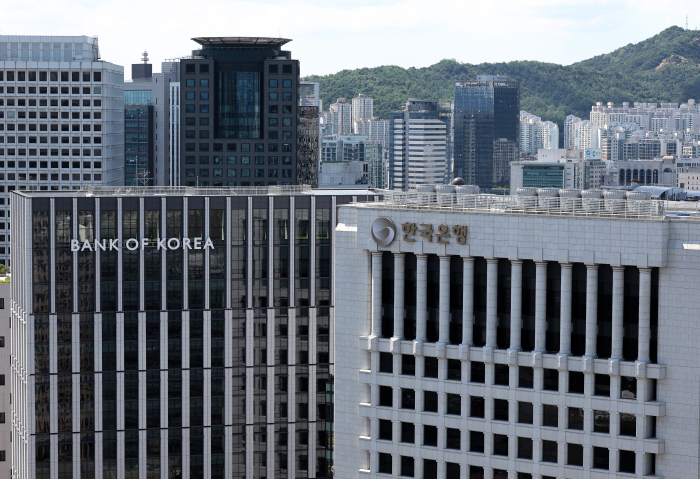Carbon neutrality
Net-zero by 2050 will hit S.Korea’s economic growth: BOK
Korea should take a slower pace in reducing carbon emissions, the central bank says
By Sep 25, 2023 (Gmt+09:00)
3
Min read
Most Read
LG Chem to sell water filter business to Glenwood PE for $692 million


Kyobo Life poised to buy Japan’s SBI Group-owned savings bank


KT&G eyes overseas M&A after rejecting activist fund's offer


StockX in merger talks with Naver’s online reseller Kream


Mirae Asset to be named Korea Post’s core real estate fund operator



The central bank said that the decarbonization roadmap would benefit some sectors, but it would also increase the financial burden on businesses. The government’s introduction of a carbon tax and direct control of emissions will add pressure to corporates’ carbon credit purchases, thus impacting the economy, it added.
Korea will be more vulnerable to such moves as its economy has a higher proportion of the sectors that emit the most greenhouse gases, the report said.
High-carbon industries, such as primary metals, electricity supply, non-metallic minerals and chemicals, account for 17.6% of the country’s gross domestic product (GDP), the BOK said.
That compares with around 10% in the US GDP, 12% and 15% in Germany and Japan, respectively, the central bank found in 2021.
The annual decline of 0.6 percentage point will be a significant burden on the economy of Korea, which expects around a 1.5% growth rate this year and faces the world’s lowest birthrate and rapidly aging population, the BOK added.
The government would need to pace the decarbonization roadmap with the development of low-carbon emitting technologies, it said.

WIDENING GAPS AMONG REGIONS
The BOK raised concerns that the net-zero policy will further widen the growth gap between the Seoul metropolitan area and others as there are more high-carbon industries based in other provinces than in the capital area.
The country’s southeastern region, which include Busan, Ulsan and South Gyeongsang Province, are expected to be hit the most by the net-zero emission policy, the report said.
In a scenario where Korea carries out the net-zero policy, the southeastern region’s gross regional domestic product (GRDP) will decline by an average of 1.5 percentage points per year from 2021 to 2050, compared with the national average of 0.6 percentage point.
The region has a high concentration of plants in the country’s major industries, such as autos, car parts and shipbuilding. High-carbon industries make up 41% of the regional GRDP, the report said.
The southwestern region, which includes Gwangju and Jeolla Province, is forecast to experience an annual GRDP decline of 1.2 percentage points during the same period, the report said. The petrochemical sector has the largest share of the region’s industries.
While Daegu and North Gyeongsang Province will have an average 0.5 percentage point decline, the Seoul capital area will see only a 0.4 percentage point drop, according to the BOK data.

BETTER SCENARIOS
The BOK said that technological developments to reduce carbon emissions are urgently required to minimize the impact on the economy.
If the technology in energy capture, storage and utilization is more advanced to reduce greenhouse gas emissions by 11.5% per year, the Korean economy’s average annual growth rate will be negative 0.5 percentage point, compared with negative 0.6 percentage point in the previous scenario.
If Korea carries out a more moderate policy, which seeks to hold the increase in the global average temperature to well below two degrees Celsius above pre-industrial levels by 2100, the country’s average annual growth rate will be negative 0.4 percentage point, the BOK found.
In the best scenario, where the country takes the moderate policy and boosts ESS technology, the decline in the annual growth rate will be 0.1 percentage point, minimizing the impact on the economy, the bank said.
Write to Jin-gyu Kang at josep@hankyung.com
Jihyun Kim edited this article.
More to Read
-
 Shipping & ShipbuildingHanwha Ocean shares sink after KDB's sale of 4.2% stake
Shipping & ShipbuildingHanwha Ocean shares sink after KDB's sale of 4.2% stakeApr 29, 2025 (Gmt+09:00)
-
 EnergySouth Korea nears Czech nuclear deal; Doosan, related stocks fly high
EnergySouth Korea nears Czech nuclear deal; Doosan, related stocks fly highApr 25, 2025 (Gmt+09:00)
-

-
 Business & PoliticsSeoul, Washington agree on July tariff deal framework in '2+2' trade talks
Business & PoliticsSeoul, Washington agree on July tariff deal framework in '2+2' trade talksApr 25, 2025 (Gmt+09:00)
-

Comment 0
LOG IN


